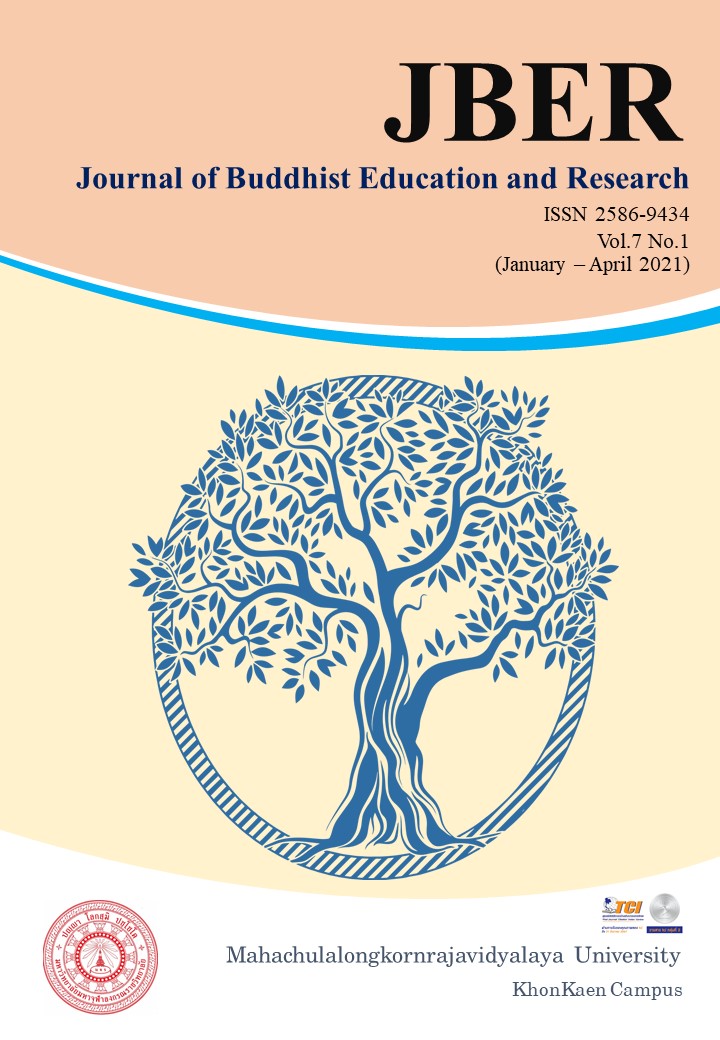THE RELATIONSHIP BETWEEN CONTENT MARKETING AND CUSTOMER ENGAGEMENT THROUGH SOCIAL MEDIA OF GENERATION Z IN KHON KAEN PROVINCE
Keywords:
Content Marketing, Customer Engagement, Social Media, Generation ZAbstract
The purposes of this research were 1) To study the social media behavior of Generation Z in Khon Kaen Province. 2) To analyze the relationship between content marketing and customer engagement through social media of Generation Z in Khon Kaen. The sample group was 307 people under the age of 23 in Khon Kaen Provice. The research instrument was a questionnaire. The statistics used for analyzing data were frequency distributions, percentage, mean, and standardize deviation and Pearson product moment correlation coefficient (PPMCC).
The Research outcomes are revealed as follows:
The most used social media platform for Generation Z is Twitter. The reasons for using social media are for entertainment, communication, following the news and shopping. The most interactive content are images with content about current situation. The result shows that content marketing on social media has medium relationship with customer engagement. Targeting customers and delivering credible and valuable content has the greatest impact on customer engagement.
References
กัญญาวีร์ อินทร์สันต์ และ บุษกรณ์ ลีเจ้ยวะระ. (2563). การสื่อสารการตลาดแบบบูรณาการ และการสื่อสารการตลาดแบบปากต่อปาก ผ่านสื่ออิเล็กทรอนิกส์ที่มีผลต่อการตัดสินใจซื้อสินค้าของลูกค้าร้านค้าปลีกแบบดั้งเดิม ในเขตจังหวัดกาฬสินธุ์. วารสารวิชาการและวิจัย มหาวิทยาลัยภาคตะวันออกเฉียงเหนือ. (10)3, 79-91.
ณัฐพัชญ์ วงศ์เหรียญทอง. (2557). Content Marketing เล่าให้คลิก พลิกแบรนด์ให้ดัง. กรุงเทพฯ: เนชั่น อินเตอร์เนชั่นเนล เอ็ดดูเทนเมนท์.
ทัศนีย์ สีนาแซง. (2563). ความคิดเห็นของวัยรุ่นต่อการใช้สื่อสังคมออนไลน์ กรณีศึกษานิสิตคณะสังคมศาสตร์.วารสารรัฐศาสตร์ปริทรรศน์ มหาวิทยาลัยเกษตรศาสตร์. 7(1), 19-34.
นิศาชล รัตนมณี และ ประสพชัย พสุนนท์. (2019). อัตราการตอบกลับของแบบสอบถามในงานวิจัยเชิงปริมาณ. Journal of Humanities and Social Sciences Thonburi University. 13(3), 181-188.
ธนกฤต วงศ์มหาเศรษฐ์. (2561) การเปิดรับการตลาดเชิงเนื้อหาของผู้บริโภคสินค้าออนไลน์ในเขตกรุงเทพมหานคร. วารสารวิชาการบริหารธุรกิจ สมาคมสถาบันอุดมศึกษาเอกชนแห่งประเทศไทย ในพระราชูปถัมภ์ สมเด็จพระเทพรัตนราชสุดาฯ สยามบรมราชกุมารี. 7(ฉบับพิเศษ), 85-94.
พรสวรรค์ ชัยมีแรง และอุมาวรรณ วาทกิจ. (2563). กลยุทธ์การจัดการด้านการตลาดโดยใช้การพาณิชย์ผ่านเครือข่ายสังคมออนไลน์ ในธุรกิจโรงแรมขนาดกลางและขนาดเล็ก. วารสารสังคมศาสตร์และมานุษยวิทยาเชิงพุทธ. 5(9), 410-424.
มนัสวี ศรีนนท์. (2561). ทฤษฎีเจเนอเรชันกับกรอบวิธีคิด. วารสารศึกษาศาสตร์ มมร. 6(1), 364-373.
มัธนา วิบูลย์ศักดิ์. (2563). เริงร่าในทวิตภพกับ Twitter แสนสนุก – คนทำงานอย่างเราได้อะไรจาก Twitter. สืบค้นเมื่อ 10 มกราคม 2564. จาก https://www.aware.co.th/it-jobs/th/what-makes-thailands-twitter-sphere-so-unique/
สำนักงานสถิติแห่งชาติ (2563). จำนวนประชากร จำแนกตามอายุ เพศ และจังหวัด พ.ศ.2563. สืบค้นเมื่อ 15 กันยายน 2563. จาก http://statbbi.nso.go.th/staticreport.
เสกสรร รอดกสิกรรม. (2558). การสร้างความยั่งยืนด้วยการใช้เนื้อหาเชิงการตลาดเพื่อสร้างความได้เปรียบเชิงการแข่งขันทางธุรกิจผ่านสื่อสังคมออนไลน์. วารสารระบบสารสนเทศด้านธุรกิจ (JISB). 2(4), 21-38.
เสมอ นิ่มเงิน. (2563). Generation กับพฤติกรรมการรับข่าวสารผ่านสื่อต่างๆ. สืบค้นเมื่อ 10 มกราคม 2564 จาก http://edoc.mrta.co.th/HRD/Attach/1566372710_1.pdf.
Cuillierier Audrey. (2016). Customer Engagement through Social Media. Thesis. European Business and Administration. Thesis. Helsinki Metropolia University of Applied Sciences. European Business and Administration. Retrieved 2521, 16 October from https://core.ac.uk/download/pdf/80987602.pdf.
Denham-Smith, J., and Harvidsson, P. (2017). Content Marketing’s effect on customer engagement. Dissertation. Retrieved 2021, 16 October,
from http://urn.kb.se/resolve?urn= urn:nbn:se:hb:diva-12685.
Lujja Abubakar and Özata F. Zeynep. (2017). The Consequences of Consumer Engagement in Social Networking Sites. Business and Economics Research Journal. 8(2), 275-29.
Moran, J.M.M. (2016). Outside-In Marketing: Using Big Data to Guide your Content Marketing. IBM Press.
Reitz, A.R. (2012). Online Consumer Engagement: Understanding the Antecedents and Outcomes. Ph.D. Dissertation. Colorado State University, Fort Collins.
Siddiqui Kamran. (2013). Heuristics for Sample Size Determination in Multivariate Statistical Techniques. World Applied Sciences Journal. 27(2), 285-287.
Simon Kemp. (2020). Digital 2020 Thailand. Retrieved 2021, 16 October from https://datareportal.com/reports/digital-2020-Thailand.
Solem Birgit.A. and Pedersen Per.E. (2016). The Role of Customer Brand Engagement in Social Media: Conceptualisation, Measurement, Antecedents and Outcomes. Int. J. Internet Marketing and Advertising, 10(4).





